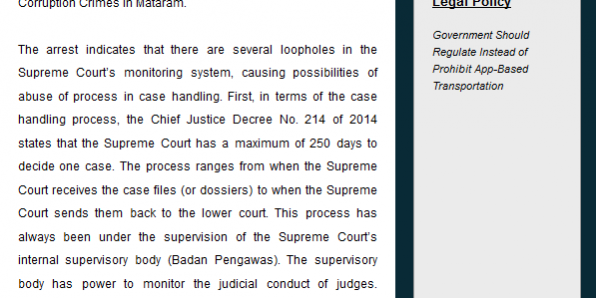Supreme Court and the Judiciary
Urgent Reform of Supreme Court’s Supervision and Administration System
The Corruption Eradication Commission (Komisi Pemberantasan Korupsi/KPK) arrested a mid-level official of the Indonesian Supreme Court, Andri Tristanto Sutisna, for allegedly being involved in a four-hundred million Rupiah bribe during an operation in Jakarta last month. The bribe was allegedly related to the delay of a corruption case verdict delivery to the Court for Corruption Crimes in Mataram.
The arrest indicates that there are several loopholes in the Supreme Court’s monitoring system, causing possibilities of abuse of process in case handling. First, in terms of the case handling process, the Chief Justice Decree No. 214 of 2014 states that the Supreme Court has a maximum of 250 days to decide one case. The process ranges from when the Supreme Court receives the case files (or dossiers) to when the Supreme Court sends them back to the lower court. This process has always been under the supervision of the Supreme Court’s internal supervisory body (Badan Pengawas). The supervisory body has power to monitor the judicial conduct of judges. However, it has no authority over the clerks and registrars of the court, even though these judicial staffs have important roles in the case handling process.
The second loophole is relating to the application of the court’s case tracking system, which was developed to store the cases’ details and monitor the case handling process. This system has been applied only on the district and appellate courts level while it has not been applied in the Supreme Court.
These loopholes are believed to have contributed towards frauds in the case handling process. In fact, the Supreme Court’s blueprint document, published in 2004, has mentioned them as problems that must be solved as part of the Supreme Court reform. Thus, in addition to support law enforcement carried out by the KPK, the Supreme Court should reopen its blueprint document in order to fulfill thorough reform towards its own organization. (EDA/MS)
==============================================================================
Legal Policy
Government Should Regulate Instead of Prohibit App-Based Transportation
App-based transportation has once again become a spotlight issue. This was triggered by the protests of taxi drivers demanding the closure of Uber and GrabCar in Indonesia as well as the issuance of the Minister of Transportation Circular No. AJ 206/1/1 PHB 2016 dated 14 March 2016 addressed to the Minister of Communications and Information concerning the “request to block applications used for ordering transportation services (Uber Taxi and Grab Car)”. The letter re-ignited controversy over this kind of transportation; before, there had been a similar letter posted to the National Police in November 2015.
The previous letter mentions that Uber and GrabCar have violated Law No. 22/2009 on Traffic and Public Transport. They do not make any compliance regarding permits to provide public transport. The transportation application companies also arranged collaborations with illegal transportation providers and individuals instead of arranging with registered transportation companies.
The Minister of Communication and Informatics diplomatically responded to unblock the apps. This is due to public needs towards such applications since the public transportation system has not been well provided. Despite public appreciation towards the minister’s prompt response, many taxi drivers and taxi companies are disappointed in the new policy due to their decreasing incomes after Uber and GrabCar entered the door-to-door transportation market.
To that end, facilitating or regulating is better than prohibiting. Australia and Canada can be seen as good examples in regulating app-based transportation. The public still needs app-based transportation. Lower prices and better service are the main reasons to choose this kind of transportation. Paying attention to the taxi drivers’ welfare should be a main concern too. Certainly several provisions must be regulated, such as regarding the obligation for foreign app-based transportation companies to establish an Indonesian legal entity, fair partnership mechanisms between app companies and transport companies, secured transactions, and the protection of both drivers and consumers. The Ministry of Transportation and Ministry of Communication and Information shall be the regulators. It is their “homework” to settle the issues regarding app-based transportation in this country. (MFA)

